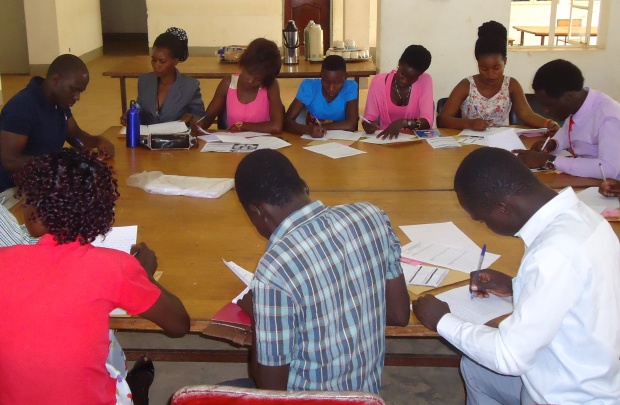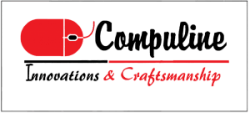WHEN RELATIONSHIPS RULE RESEARCH
Education Specialists take a moment after an Action Research in Adult Education Workshop at Kyambogo University, Kampala Uganda.To join and belong to the community of social scientists goes with all sorts of inductions. Therein you find varied groups ruled by certain values and traditions in their search for knowledge . One group will insist that to be a good researcher, you must be very careful not to be influenced by interactions with subjects because such relationships easily contaminate your data with bias.
Strict obedience to such positivist research traditions is a hot debate (Flyvbjerg, Sampson 2001) which I choose not to provoke here. I am instead motivated to share a bit of our lessons from a research project in Uganda where we are witnessing the indispensability of relationships in our kind of social science research. The research is about Ugandan youth’s agricultural education-employment transitions. It is aimed at an in-depth examination of personal and contextual influences on young people’s education and employment choices. It is also aimed at exploring how agric-based youth employment interventions can optimize young people’s labour market transition into the sector across its rich value chain.
I can say that there is no magic formulae, but correct chemistry is the mainstay of our participatory action research. The human links and interactions through talking to each other; openly and candidly sharing what we think, imagine and feel about the research process and outcomes is critical (Wicks, Reason 2009). It is core to the flourishing of participatory inquiry for collective understanding and search for solutions. Action research is a group commitment, and the interactions between and among all research participants is real lifeblood because as relationships deepen, our understanding deepens (Newton, Goodman 2009). Without a deepened collective and participatory understanding of social reality, it is unrealistic to imagine of long-term organisational and social change.
THE GREATEST LESSONS
So far, one of our greatest lessons at our main case study is the centrality of the required skills and attributes of action researchers to communicate and relate effectively to build productive relationships. Not different from love or marriage chemistry, action research chemistry comes at a cost and moreso the investment to deal with tensions of interest. The pain of accepting and facing the truth that for instance, two or more members of the ‘research family’ do not feel connected or interested. The emotional pain to wait or even postpone moments to taste and experience aspects of the core pleasures of the relationship. Our participatory action research experience is reminding us of the values of patience, openness, trust and humility; and their influence on correct chemistry. Often, we need to go slow to know and trust each other a little more!

Personal responsibility: Each of these young people in one of the conversational action research workshops is thinking about, writing and internalising his/her current and dream life
At the case study College, we have had to delay our ambitions to deliver on targets and deadlines. We have had to think of non-conventional ways of reaching out to seemingly less enthusiastic members of the wider research family. At some point we organised a ‘research lunch hour’ to informally tickle without nagging the entire teaching and non-teaching work force. Our regular research news update (click this hyperlink to read full text) is a product of an informal meal time which we had after a productive conversation with a prominent member of the wider research family who had expressed reservations about the research team’s plans to hold a validation workshop sometime in the mid of the year.
THE PHILOSOPHICAL BASIS
But why is this emphasis on correct chemistry or productive relationships? As action researchers, we are not detached from what we want to understand and change (Adelman 1993). Actually, to sound a bit academic is to say that, we clarify that our ontological and epistemological frame of reference is clear! To us, reality is socially constructed and to know it better we must deeply interact with those who have a ‘creational’ connection with the reality under study.
Our research project is inspired by authors who pronounce the construct of ‘social space’ in understanding and guiding organisational and social change processes (Friedman 2011). Writers and scholars who pull out the notions of interactions and relationships-building from Kurt Lewin’s (father of action research) work do inspire our resilience to learn to manage the dynamics involved in creating action research chemistry. The chemistry we are talking about is so central because action research is a democratic process designed to nurture self-determination, empowerment and autonomy of practitioners to think and act differently (Susman, Evered 1978)
ABOUT THE BLOGGER
Robert Jjuuko is a PhD Candidate at the Globalization Studies Groningen (GSG), University of Groningen, in the Netherlands. He is a Ugandan adult educator with more than 15 years of experience in the theory and practice of education and training for youths and adults. He is author of a monograph titled ‘Developing vocational skills of youths with incomplete schooling – a case study of private provision in Uganda’
REFERENCES
ADELMAN, C., 1993. Kurt Lewin and the Origins of Action Research. Educational Action Research, 1(1), pp. 7-24.
FLYVBJERG, B. and SAMPSON, S.L., 2001. Making social science matter : why social inquiry fails and how it can succeed again. Cambridge : Cambridge University Press,.
FRIEDMAN, V.J., 2011. Revisiting Social Space: Relational Thinking about Organizational Change. Research in Organizational Change and Development. Emerald Group Publishing Limited, pp. 233-257.
NEWTON, J. and GOODMAN, H., 2009. Only to connect: systems psychodynamics and communicative space. Action Research, 7(3), pp. 291-312.
SUSMAN, G.I. and EVERED, R.D., 1978. An Assessment of the Scientific Merits of Action Research. Administrative Science Quarterly, 23(4), pp. 582-603.
WICKS, P.G. and REASON, P., 2009. Initiating action research: challenges and paradoxes of opening communicative space. Action Research, 7(3), pp. 243-262

